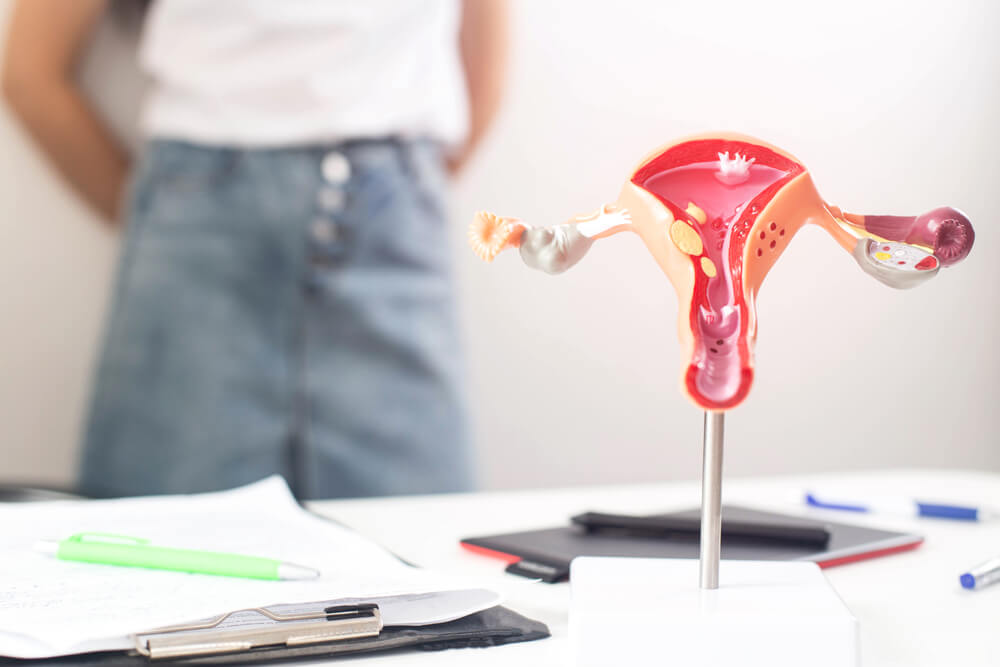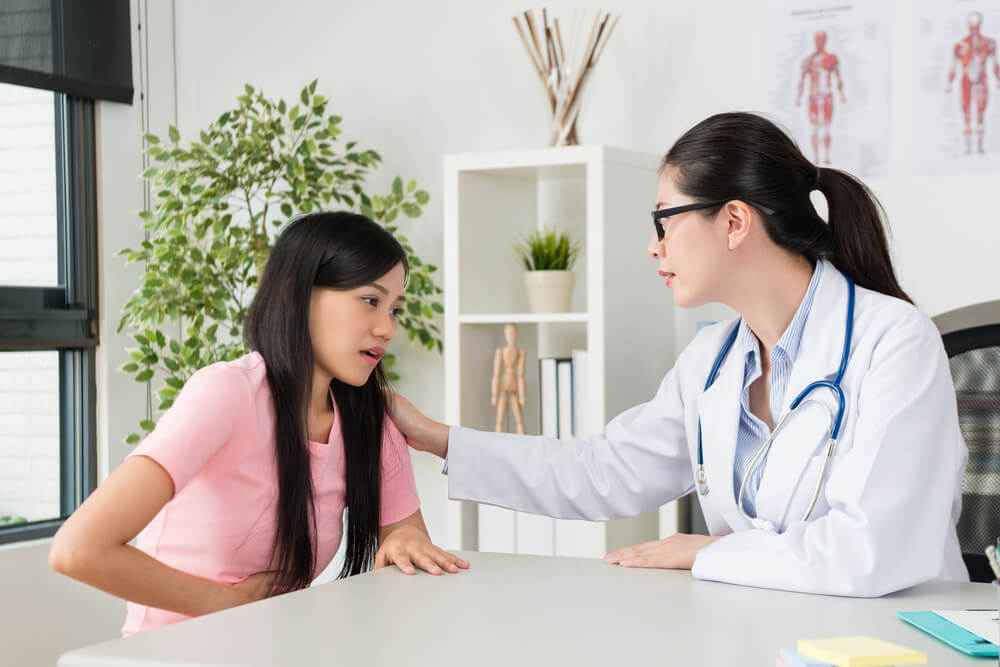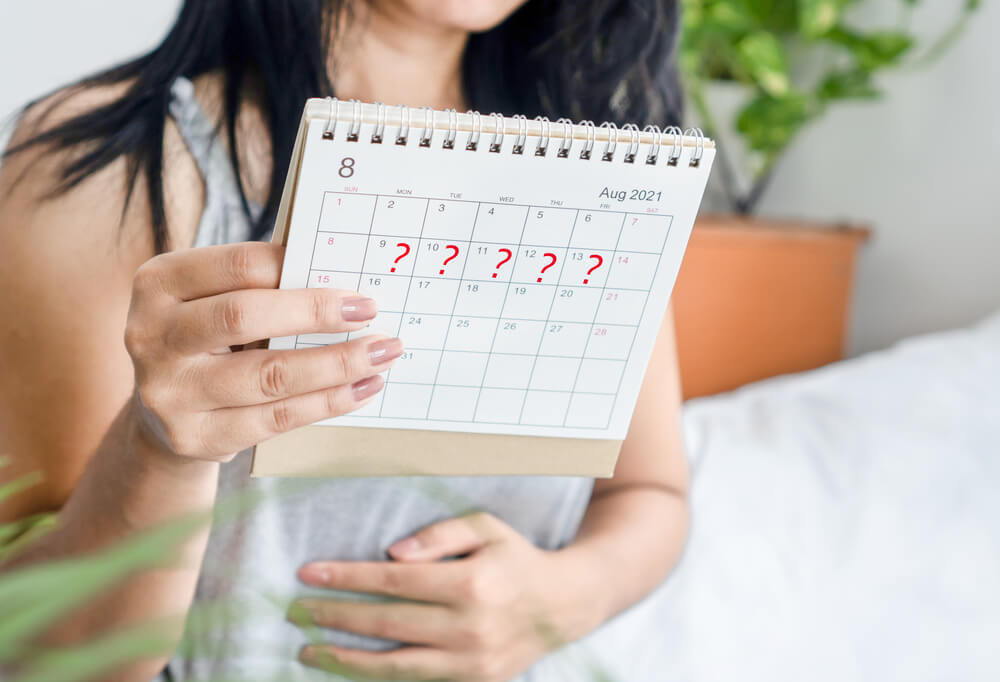An average menstrual cycle ranges anywhere from 24 to 38 days. After all, every woman is different, which also means that their menstrual cycles will also differ. Not to mention that the cycle can vary every month individually. That said, one’s menstrual cycle may last a couple of days longer or shorter in a particular month than the previous one. And if a person generally has shorter cycles, they might even get two periods in one month, e.g., at the very beginning and very end of the month. In that respect, having a period twice a month doesn’t have to be a reason for concern. However, if this is not a common occurrence for you, or you suspect that the bleeding may not be menstruation at all but spotting, you should check in with your doctor and see whether you need a gynecological treatment. Only a professional can identify the cause of getting a period every two weeks.
Potential Causes of Two Periods in One Month
As mentioned, a naturally shorter menstrual cycle can be the main reason why you get a period twice a month. On the other hand, the issue may lie in some other health condition that could be triggering vaginal bleeding. However, if you’re asking yourself why did my period come early when you don’t tend to have shorter cycles and find this change too sudden, this might be because of the following:
- Thyroid issues such as hyperthyroidism or hypothyroidism
- Entering the perimenopause stage
- Lack of ovulation, i.e., anovulation
- Presence of cysts or fibroids in the uterus
- Extreme loss or gain of weight
- Feeling stressed
- Taking birth control
- Some other illness
Why Did My Period Come Early?

Now, if you’ve known your cycle to be pretty regular, suddenly getting a period every two weeks can feel alarming. If this is not common for you, the reason for extra bleeding might be some medical conditions. What’s more, some of the following conditions are known to cause vaginal bleeding, which can then be mistaken for a menstrual flow, such as
spotting during pregnancy, irregular periods, and pregnancy are more common than one may think, especially in the early stages of pregnancy. Of course, while some light spotting is nothing unusual, you should always seek medical attention if you’re dealing with heavier bleeding while pregnant.
If you believe you’re pregnant and you suddenly start bleeding heavier than what could be considered mere spotting, it might be a miscarriage, which is why it’s necessary to call your doctor quickly.
Aside from irregular periods and pregnancy, a change in the menstrual cycle is also associated with polycystic ovary syndrome (PCOS). In this case, you might also notice some outward changes such as skin issues like acne, unusual hair growth on the face and body, hair loss on the head, etc.
Sexually transmitted infections (STIs) are often accompanied by unusual vaginal bleeding and discharge. If you’ve had unprotected sex with a new partner relatively recently before suddenly getting a period twice a month or noticing vaginal discharge of strange color and odor, make sure to schedule an appointment with your gynecologist as soon as possible.
Another big reason why you might be suddenly having to wonder why did my period come early is perimenopause. On the opposite end of the spectrum, from irregular periods and pregnancy, the onset of menopause can also cause hormonal fluctuation, which can result in more frequent periods for the time being as well, not just sparser ones.
Potential Risk Factors for Shorter Menstrual Cycle
Teens and preteens who have just gotten their period could easily experience having two periods in one month simply because hormonal fluctuations during puberty are normal. Moreover, this could happen for up to two years after starting menstruating.
On the other hand, you’re also at a higher risk of having a shorter menstrual cycle and sometimes getting a period every two weeks if you have a family history of early-onset menopause, cysts, and/or fibroids.
Of course, just because you may be in the increased risk group doesn’t mean you’ll necessarily have to deal with more frequent menstrual bleeding at all.
When to Go to a Doctor
For some people, getting two periods in one month is nothing unusual and not a reason for concern. However, if you find the change in your cycle to be untypical for you personally, you should definitely consult a doctor. That said, don’t hesitate to schedule an appointment in case you:
- Suffer from lower abdominal pain that doesn’t seem to subside even after a few days
- Experience rather heavy bleeding that fills up a pad in two to three hours or shorter
- Believe that you have vaginal bleeding/spotting in between periods and not an actual period
- Feel pain during sexual intercourse
- Find that your period blood has some darker and thicker clots in it
- Experience more severe menstrual cramps than what’s typical for you
Potential Complications Due to Extra Bleeding

While a naturally shorter menstrual cycle shouldn’t pose any danger to one’s health, some complications could happen, especially if having more frequent periods is not typical for you.
Anemia is the most prominent issue that could arise from extra bleeding. It’s characterized by the lack of iron in the blood. The common symptoms of anemia include weakness and fatigue, headaches and dizziness, as well as irregular heartbeat and shortness of breath. Just having two periods in one month doesn’t necessarily warrant anemia; this condition can happen after several months of experiencing very heavy menstrual flow.
In case getting a period twice a month is not something you’re used to, you might find it challenging to keep track of your ovulation. If you don’t plan to conceive any time soon, make sure to use some kind of contraceptive method during sexual intercourse.
On the other hand, if you wish to get pregnant but have issues with very heavy menstrual bleeding, definitely discuss this with your doctor. This issue can make it more challenging to conceive.
Can This Condition Be Treated?
The treatment for heavy bleeding and shorter menstrual cycles will depend on the cause. Again, if shorter cycles are regular for you or you’re a teen who’s just started menstruating, the treatment may not be necessary at all. Iron supplements can manage the symptoms of anemia as well. And if some other condition triggers heavier and more frequent bleeding, such as thyroid issues, fibroids, hormonal imbalance, etc., the doctor will prescribe adequate treatment for that condition in particular.
Stress can only make things worse, so if you notice spotting in between periods or get a period too fast than what’s normal for you, do your best not to panic. Schedule an appointment with your doctor, and they’ll be able to identify the cause of a shorter cycle and provide you with the proper treatment. If you’re looking for a professional and experienced gynecologist whom you can fully trust and feel comfortable with, don’t hesitate to reach out to Dr. Krinsky at Gynecology and Women’s Wellness.


